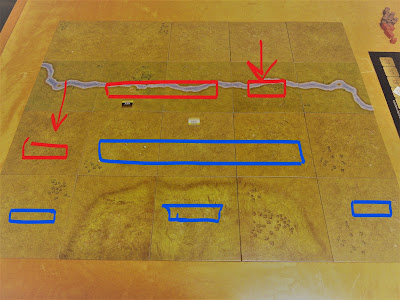To keep myself sane between bouts of work and assignments due I've decided to run through a little Alexander campaign using the boardgame version of Lost Battles. Oddly enough, in all my years of playing Lost Battles, I haven't actually played through the Alexander scenarios. I did a couple of turns of the Granicus for a video tutorial, but as far as I can recall, that's all.
I had been waiting to finish painting up my Persians to do the Alexander battles, but as the big guy in the sky alone knows when that project may ever be completed, what's wrong with cheating a little and using the boardgame for its intended purpose?
Anyway, I played through the Granicus scenario last night, so here's an account of the affair.
Deployment turn, with the Persians in the foreground. They have a line of horse defending behind the river with mercenary hoplites off table ready to march into prominence. Alexander commands his right, with the Macedonian cavalry and the hypaspists as his main strike force. The phalanx is in the centre, and Parmenion holds the left.
Here it is transposed to our representation. Blue represents the Persians, red the Macedonians.
On turn two the Persians engage the Macedonian right and the hoplites come onto the field. Alexander attacks; Companion cavalry advances to engage the Persian left; Parmenion advances.
Turn three has the Persians outflanking Parmenion and reinforcing the centre with the Greek mercenaries. A lack of commands limits the effectiveness of the Persian attacks, but the phalanx is under pressure crossing the river.
Alexander is forced to pull back the Agrianians and the Prodromoi after heavy fighting. The hypaspists advance to bear the brunt of the Persian resistance while Alexander himself probes for a weak point.
On turn four a powerful Persian attack supported by the Greek hoplites sees the central phalanx waver, but it holds due to a timely intervention of the Gods (the 'Favour of the Gods' counter was played by Alexander to force a re-roll of a spectacularly successful Persian attack; an attack which could not be repeated so effectively the second time).
The Companions are victorious on the far right of the Macedonian line.
On turn five the Persian line continues to crumble. The left gives way as Alexander commits himself to the forefront of the fight.
On turn six the Persians rout entirely.
After victory points are tallied, the Macedonians and their young king have won a clear - bordering on major - victory, and Darius III has a fight on his hands.
So, a good start for Alexander. He was fortunate indeed to have the Gods on his side!









Very good, does the scenario allocate the Favour of the Gods counter to Alexander and does Darius get any help of a similar nature?
ReplyDeleteHi Norm - at start either side can use it on their own or the other side's combat rolls, but once used it is passed to the other player and if/when they use it is it's passed back and so on. It was only used twice in this game: once by Alexander against a double 6 result, and once by the Persians in a similar situation. It can be used offensively (ie, to re-roll a vital, good-odds attack that was duffed) but cannot be used to re-roll morale tests.
DeleteIt sounds a bit half-baked but is actually very good in play.
Cheers,
Aaron
I have used a similar mechanic (The Advantage Chit) in quite a few boardgames - at first it can seem powerful, but the tension of actually using it comes from then having to surrender it to the other player.
DeleteWell said Norm - that's it exactly. "Is it worth giving it up just to re-roll this one measly attack...?" It ends up having a psychological impact quite beyond its actual game impact.
DeleteAnd this is where Darius says, "My dice were not good and Alexander got lucky dice rolls." :D
ReplyDeleteHa ha, yes - but the members of the pantheon know that 4 attacks out of a zone - many blessed with combat modifiers - will tend to beat 2 attacks every time!
DeleteCheers,
Aaron
Interesting Aaron, who does it compare to CCA? I have the Lost Battles book but not the board game, I think it is out of print now?
ReplyDeleteGood question Mike, and a detailed comparison would be worth a blog post of its own (thanks for the suggestion!). To give a rough idea but without going into great detail, CCA is 80% game, 20% simulation; LB the opposite at 80% simulation, 20% game.
DeleteYou are right that the board game is out of print and, I believe, quite expensive on the used market.
Cheers,
Aaron
Thanks Aaron. I see you have an article on it the latest issue of Silngshot which arrived today.
DeleteAh, there I go, lowering the tone again! ;-)
DeleteI think you can get the lost Battles book on the kindle, but I am not fully sure tat the book delivers all of the rules / scenario (i.e. you just build your own battleboard and provide the figures).
DeletePeople can always get the previous iteration, Strategos II, from the Society of Ancients. It's just the rules and scenarios, not all the designer notes, and it's pretty cheap. There are a few changes between editions but it's playable as-is, and anyone interested can find the updates on the Lost Battles yahoo group anyway.
DeleteThat was fun read. Thanks Aaron:)
ReplyDeleteCheers
Kevin
Thanks, Kevin!
DeleteGreat to see the boardgame getting an outing.
ReplyDeleteThere are more games to add, but no time to write them up!
Delete